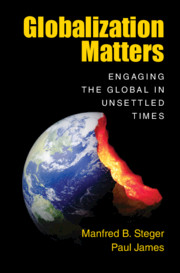Book contents
- Globalization Matters
- Globalization Matters
- Copyright page
- Contents
- Figures
- Acknowledgements
- 1 Introduction
- 2 Mapping a New Genealogy of ‘Globalization’
- 3 Rethinking the Dominant Framework of Globalization Theory
- 4 Considering the Subjective Dimensions of Globalization
- 5 Outlining an Engaged Theory of Globalization
- 6 Excavating the Long History of Globalization
- 7 Examining the Promise of Global Studies
- 8 Making Sense of the Populist Challenge to Globalization
- 9 Confronting the Global Urban Imaginary
- 10 Living in the Unsettled World of the Anthropocene
- 11 Concluding Reflections
- Appendices
- Bibliography
- Index
11 - Concluding Reflections
Published online by Cambridge University Press: 01 August 2019
- Globalization Matters
- Globalization Matters
- Copyright page
- Contents
- Figures
- Acknowledgements
- 1 Introduction
- 2 Mapping a New Genealogy of ‘Globalization’
- 3 Rethinking the Dominant Framework of Globalization Theory
- 4 Considering the Subjective Dimensions of Globalization
- 5 Outlining an Engaged Theory of Globalization
- 6 Excavating the Long History of Globalization
- 7 Examining the Promise of Global Studies
- 8 Making Sense of the Populist Challenge to Globalization
- 9 Confronting the Global Urban Imaginary
- 10 Living in the Unsettled World of the Anthropocene
- 11 Concluding Reflections
- Appendices
- Bibliography
- Index
Summary
Beyond fleeting newspaper headlines or passing academic fads heralding ‘globalization’s failure’, this book has advanced the case for the continued relevance of globalization in both theory and practice. At the same time, however, the stark reality of the Great Unsettling looms large. The world in the early twenty-first century faces significant disintegrative threats. The destabilization of familiar life-worlds is well underway. Deep social volatility is occurring on a scale and at a speed perhaps never before seen in human history. For example, global economic growth is uneven and plagued by contradictions, resulting in troubling consequences such as the seismic shift from secure long-term employment to precarious short-term work, increasing automation, and the rise of inequality within and between countries. An associated climate of insecurity and loss of identity has penetrated people’s consciousness down to its ontological core. These concluding reflections outline how the book has attempted to stretch the existing body of scholarship on globalization to examine the structural conditions and complex dynamics of global social formation under contemporary unsettled conditions.
- Type
- Chapter
- Information
- Globalization MattersEngaging the Global in Unsettled Times, pp. 251 - 258Publisher: Cambridge University PressPrint publication year: 2019

